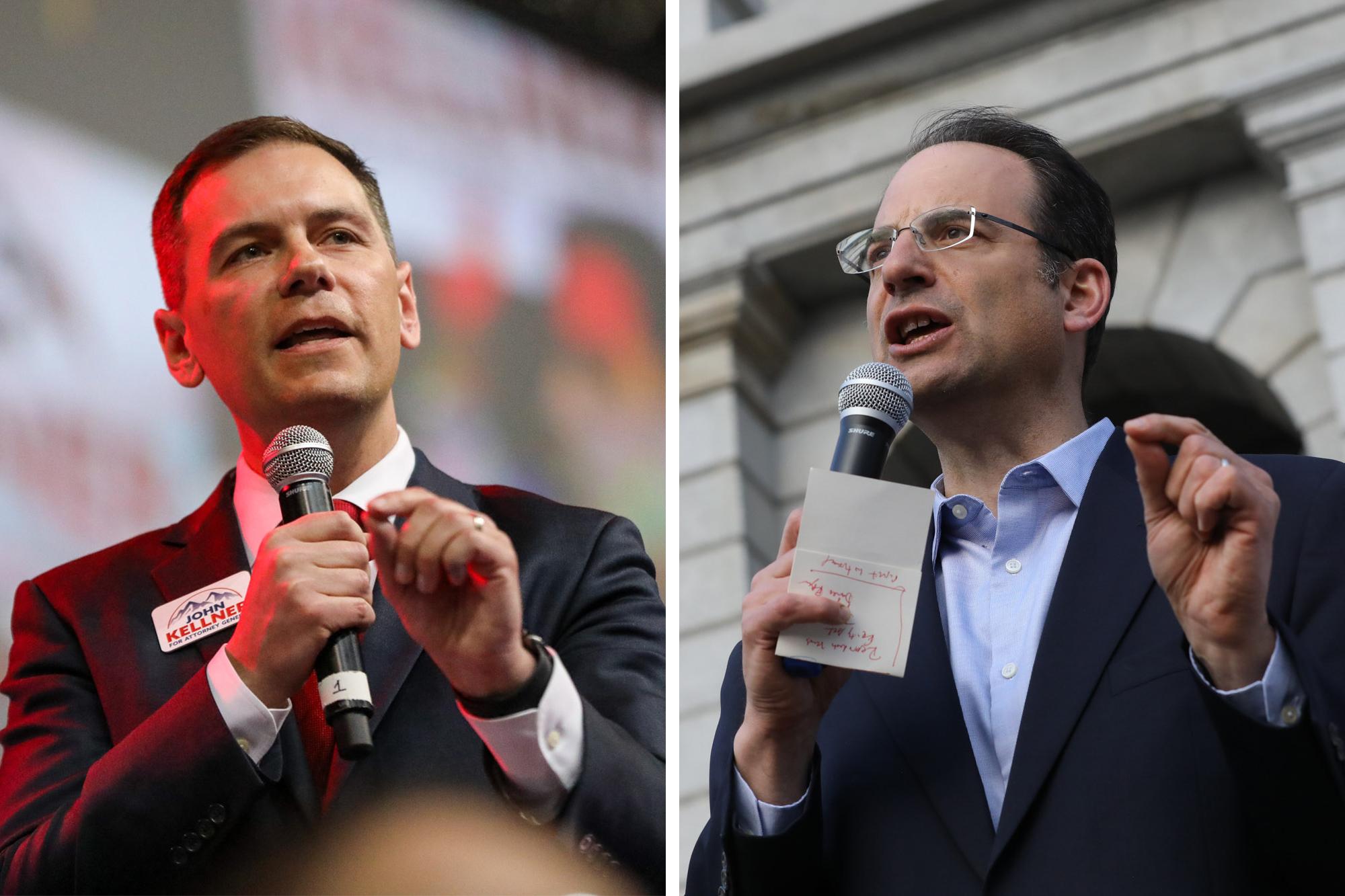
Democratic Attorney General Phil Weiser and Republican John Keller faced off in a feisty debate Tuesday taking on civil rights, police brutality, the repeal of Roe v. Wade and consumer protection fights for Coloradans in one of the first debates of the campaign season.
While answering questions about Colorado’s red flag law and environmental regulation, Kellner, the district attorney for Arapahoe and Douglas counties, continued to beat a consistent message of a crime-plagued state that isn’t as nice of a place to live as it was four years ago.
“Do you feel safer now than you did four years ago before Mr. Weiser was elected?” he said. “I ask you to elect someone who understands what crime is doing to our communities.”
Weiser, who was first elected attorney general in 2018, touted his record in bringing $400 million in opioid settlement dollars to Colorado, working to change the way police are trained and going after both local and national companies that have duped Coloradans out of money.
Weiser also said he would strenuously work to defend the state’s abortion laws in the wake of the Supreme Court overturning Roe v. Wade.
“If any other state tries to criminalize a patient or a doctor in Colorado, I will be fighting to protect Colorado’s law. If there is a movement to overturn this law, I’m committed to fighting against that,” he said. “I was trained by Ruth Bader Ginsburg and the concept of equal protection of the laws and reproductive health care … is something that is deeply in my commitment.”
Kellner said he supported the Supreme Court’s decision and that he personally opposes abortion. But he also said it has been tested many times on Colorado ballots, and said he would enforce the state’s laws.
“I’m not picking and choosing winners and losers in the AG’s office,” he said. “I’m not making policy decisions based on my personal beliefs.”
Tuesday’s debate was among the first in a handful of face-offs in the AG race that will be held before November’s election. It was hosted by Democratic state Sen. Rhonda Fields and about150 people crammed into a small room at the student center at the Community College of Aurora to hear the candidates. The college is in Fields’ state senate district.
In the end, Fields got the final question about racial healing and police brutality. Aurora’s Interim Police Chief Dan Oates stood just a few feet away.
“I’m a grandmother. And I don’t want to keep having these conversations with my kids on how to drive,” Fields said. “I’m Black … How do we hold law enforcement accountable for their lack of judgment when we see that excessive force wasn’t warranted and it was exercised? … Speak to discrimination, speak about hate. What I’m seeing is Black people and Brown people and gay people are under attack.”
Kellner said that he has supported strengthening the state’s hate-crime laws. He also opened up a hate crime unit in his 18th Judicial District, which includes Arapahoe, Douglas and Elbert counties. He said he is also prosecuting an Aurora police officer who beat up a homeless man with his pistol and was later fired.
And Kellner said that while the police make mistakes, he supports them, including the Aurora Police Department.
Weiser said he has worked to boost “emotional intelligence” in police training in Colorado. He told a story about an officer who was involved in a “bad” police shooting, and Weiser learned the officer had just responded to a child abuse call and was likely not in a good head space to deal with the next hard call.
Weiser also said he had spent four years trying to show up at churches and across the state — in every county more than once.
“First thing we have to do is show up everywhere,” he said. “Showing up and listening is the basis of building trust and when this issue came up about racial inequities in policing, we got a law passed. And I didn’t just fight for those tools, I’ve used those tools.”
Weiser was referring to his newfound power — granted by the state legislature in 2020 — to open up investigations into law enforcement agencies’ patterns and practices. His office has entered into a consent decree with the Aurora Police Department after investigators found a pattern of racially biased policing.
Weiser also opened an investigation into the district attorney in the San Luis Valley, who was found to have been repeatedly violating the Victim’s Rights Act. That DA has since resigned.
Both candidates had similar answers to what they thought is Colorado’s biggest problem. Kellner cited the crime rate, the state’s high rates of motor vehicle thefts and fentanyl overdose deaths.
“Crime is crushing Coloradans,” Kellner said. “It is soft in crime policies and laws … that have led us to where we are when it comes to crime.”
Weiser said it was gun violence — not only homicide but also suicide.
“The challenge around gun violence is one we must commit to,” he said, citing his support of the ban on large capacity magazines for automatic weapons and safe gun storage requirements statewide. “We have a mental health crisis. We have a substance abuse crisis. What underlies that is a connection crisis.”
Both said they supported the state’s red flag law, which allows law enforcement and some family members to petition a judge to remove weapons from the home of an individual thought to be dangerous to himself or others.
“I’ve talked to members of my own party about this,” Kellner said. “I’m often asked that question, what would you do? And I have to say this truthfully. Look, if I knew there was a man with orange hair threatening to kill a crowd full of people in my community and I had some way to prevent that from happening? Darn right I’d use that tool.”








